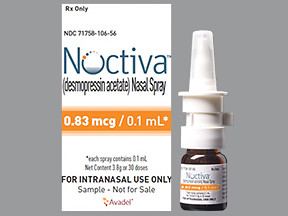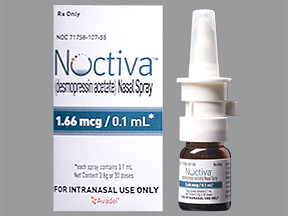DESMOPRESSIN SPRAY (NOCTURIA) - NASAL
PHONETIC PRONUNCIATION: (DES-moe-PRES-in)
COMMON BRAND NAME(S): Noctiva
GENERIC NAME(S): desmopressin acetate
Uses
USES: Desmopressin is a man-made form of vasopressin. Vasopressin is a substance in your body that helps control how much urine you make. This medication is used by adults who wake up 2 or more times during the night to urinate due to a condition called nocturnal polyuria. This is a condition where your body makes too much urine at night. Other conditions can also cause you to wake up at night to urinate, so you will receive this treatment only after tests by your doctor show you have this condition. Do not use this medication to treat children who wet the bed at night.
How to use DESMOPRESSIN SPRAY (NOCTURIA) - NASAL
HOW TO USE: Read the Medication Guide and Instructions for Use provided by your pharmacist before you start using desmopressin and each time you get a refill. If you have any questions, ask your doctor or pharmacist. Follow the instructions to properly prime the bottle if you are using it for the first time or if you have not used it for more than 3 days. Do not shake the bottle. Before using, blow your nose to clear your nostrils. Spray this medication in the nose as directed by your doctor, usually once daily, about 30 minutes before going to bed. Limit drinking water and other fluids close to bedtime while using this medication. Consult your doctor for details. The dosage is based on your medical condition, age, and response to treatment. Do not use more desmopressin or use it more often than prescribed. Use this medication regularly to get the most benefit from it. To help you remember, use it at the same time each day. If you develop nose problems (such as blockage, runny/stuffy nose due to a cold) while using this medication, tell your doctor right away. Your doctor may direct you to temporarily stop using this medication until your symptoms get better. Tell your doctor if your condition does not get better or if it gets worse.
Side Effects
Precautions
Interactions
Overdose
Images
Reviews
Warning
WARNING: Desmopressin can rarely cause a low level of sodium in the blood (hyponatremia), which can be serious or even fatal. Drinking too much liquid, using certain medications (such as "water pills"/diuretics including furosemide, glucocorticoids such as prednisone), being 65 years or older, or having certain medical conditions may increase the risk of low sodium in the blood. Lab tests (such as urine tests, sodium blood levels) must be done before you start using this medication and while you are using it. Keep all medical and lab appointments. Tell your doctor right away if you develop symptoms of low sodium in the blood, such as nausea, vomiting, headache, muscle weakness/cramps, unusual tiredness, unusual drowsiness, dizziness, restlessness, mental/mood changes including confusion/irritability. Get medical help right away if you have any very serious side effects, including seizure or trouble breathing.
Disclaimer
IMPORTANT: HOW TO USE THIS INFORMATION: This is a summary and does NOT have all possible information about this product. This information does not assure that this product is safe, effective, or appropriate for you. This information is not individual medical advice and does not substitute for the advice of your health care professional. Always ask your health care professional for complete information about this product and your specific health needs.


No Reviews Yet